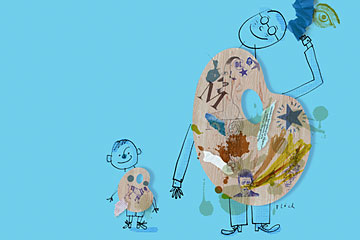
(4 of 6)
Such aha experiences, also called insight solutions or pop-out solutions, are big parts of creativity--the sudden idea for an opera, the sudden solution to a knotty part of a novel. When Aziz-Zadeh's subjects solved a word in that quick and satisfying way, they would push one button in the fMRI. When they used the more deliberate search method, they would push another. "With the search method," she says, "we saw activity only in the left hemisphere, but with the aha moments it was in both." What's more, in those latter cases there was additional activity in the insula and the brain stem, which also process emotion--helping explain the delicious thrill a sudden insight gives us. The more cross talk you get between the hemispheres--something older people are very good at--the more of those happy pop-outs you get, leading to a self-reinforcing loop in which creating a little gives you a taste for creating a lot.
A similar loosening of the brain's reins helps explain the way all of us--young and old--can sometimes go to bed at night trying to solve a problem and wake up in the morning with an answer or a burst of inspiration. When we go to sleep, the prefrontal cortex--which consolidates and integrates knowledge and acts as a sort of beat cop, keeping the other, unruly regions of the brain in line--powers down. At the same time, the occipital lobe, which processes information visually and symbolically, goes into high drive. Over the course of the night, the occipital is free to come up with novel, unlikely solutions to whatever problem is on our mind and slip them to us either in a dream or just as we wake up, before the more literal prefrontal region goes back to work. For the aging, less rigidly structured brain, the same kind of thinking takes place all the time. "Your inhibitions get taken away a little bit," says Bartzokis. "That process of losing things may actually make you more creative."
Breathing Room in the Brain
For the older person, simple life circumstances may help liberate the mind too. Even if you're explosively creative, when you're in young adulthood and middle age there are a lot of things making demands on your time and your mind--raising kids, paying off a mortgage, holding down a job. That kind of activity does not come free, and at some point you may simply tap out the energy reserves that could otherwise go to making you creative. But, says psychologist Robert Levenson of the University of California, Berkeley, who studies emotion and aging, "when you're older, you're off that treadmill, so you can free up some horsepower in the service of creativity."
That certainly describes the experience of Irene Morey, 97, who lives in Boston and worked as a nurse until her retirement at 65. Her husband was a professional artist, and when she left nursing, she decided to enroll in college and study painting. After she graduated, she joined him in the studio he built in their home, where they spent their days working together until his death. She continues to paint, now living independently, though a daughter who lives nearby looks in on her regularly.
